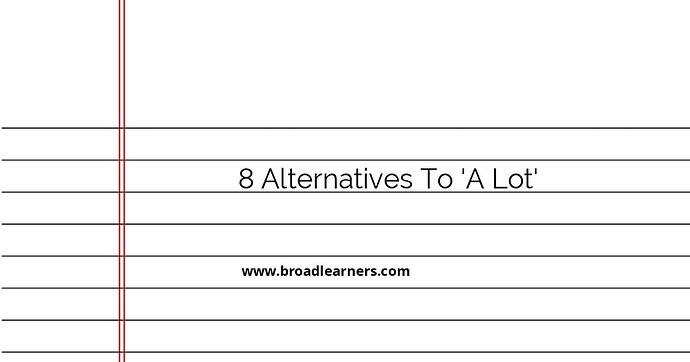When writing or speaking, it's essential to have a wide range of vocabulary to express yourself effectively. 'A lot' is a common phrase, but using alternatives can make your communication more interesting and precise. Here are eight alternatives to 'a lot' along with examples:
- Abundant: There was an abundant amount of food at the party.
- Plenty: There are plenty of opportunities for growth in this company.
- Considerable: She had considerable experience in the field.
- A Vast Amount: He had a vast amount of knowledge on the subject.
- Significant: There was a significant improvement in her performance.
- Heaps: We received heaps of positive feedback on the project.
- Substantial: She made substantial progress in her studies.
- Many: There were many reasons for the decision.
1. Abundant
Using 'abundant' instead of 'a lot' can add richness to your language. It implies a plentiful or copious quantity of something.
Example:
There was an abundant amount of food at the party, ensuring that no one left hungry.
2. Plenty
'Plenty' suggests more than enough or a satisfactory amount of something. It is a versatile word that can be used in various contexts.
Example:
There are plenty of opportunities for growth in this company, allowing employees to advance in their careers.
3. Considerable
'Considerable' indicates a large or significant amount of something. It is often used to emphasize the extent or magnitude of a particular situation.
Example:
She had considerable experience in the field, making her a valuable asset to the team.
4. A Vast Amount
'A vast amount' denotes an immense or extensive quantity of something. It conveys the idea of abundance on a grand scale.
Example:
He had a vast amount of knowledge on the subject, making him the go-to person for any queries.
5. Significant
'Significant' implies an important, notable, or considerable amount of something. It highlights the value or impact of a particular quantity.
Example:
There was a significant improvement in her performance after implementing the new strategies.
6. Heaps
'Heaps' is an informal alternative to 'a lot,' suggesting a large or abundant quantity of something. It is commonly used in casual contexts.
Example:
We received heaps of positive feedback on the project, indicating its success among the stakeholders.
7. Substantial
'Substantial' indicates a significant, considerable, or worthwhile amount of something. It is often used to emphasize the tangible or material nature of a quantity.
Example:
She made substantial progress in her studies, demonstrating her dedication and hard work.
8. Many
'Many' denotes a large number or quantity of something. It is a straightforward alternative to 'a lot' and is suitable for various contexts.
Example:
There were many reasons for the decision, each contributing to the overall outcome.
Did I miss anything? Respond below
